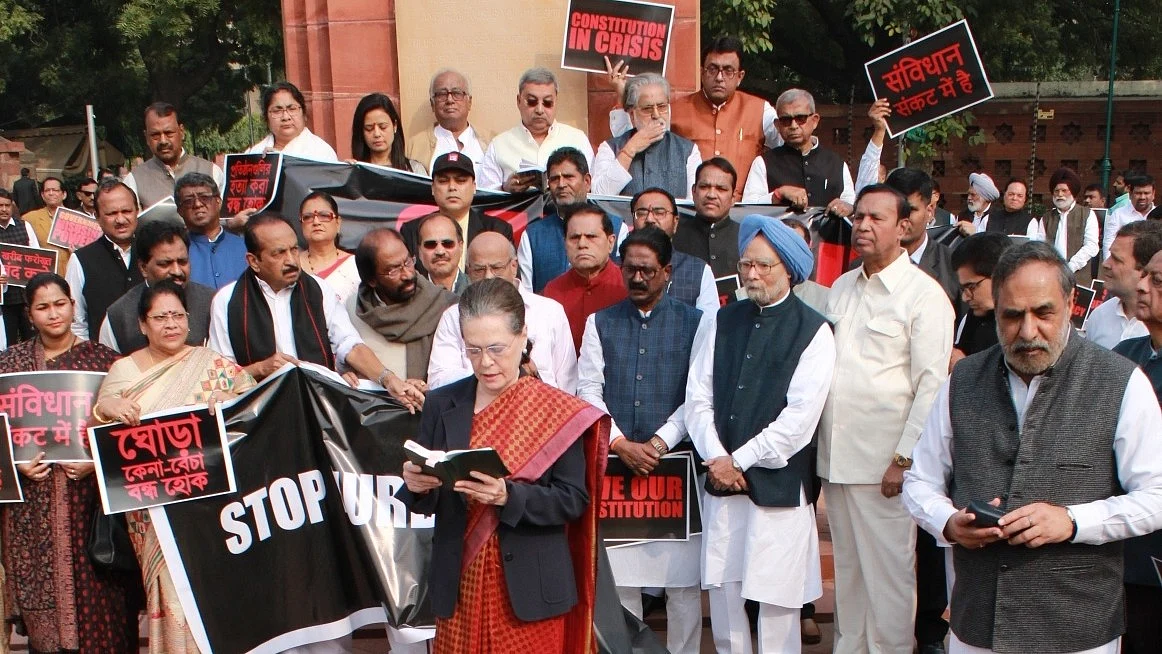POLITICS
Shouldn’t the RSS general secretary first read the Supreme Court ruling on the Preamble?
In November 2024, the apex court held that the Preamble was an inalienable part of the Constitution of India, though Parliament had an 'unquestionable' right to amend both

Seven months after the Supreme Court dismissed petitions demanding that the words ‘secular’ and ‘socialist’ be removed from the Preamble to the Constitution because they were incorporated in 1976, RSS general secretary Dattatreya Hosabale has once again raked up the demand on 26 June 2025.
On 24 November 2024, the Supreme Court had upheld the addition and inclusion of the words ‘socialist, secular’ in the Preamble to the Constitution of India. A division bench presided over by Chief Justice of India Sanjiv Khanna and Justice Sanjay Kumar dismissed a batch of petitions filed by the BJP's Subramanian Swamy, lawyer Ashwani Upadhyay and others.
The petitioners had claimed that inserting the two words in 1976 amounted to a fraud on the Constitution because the word ‘secular’ was deliberately eschewed by the Constituent Assembly.
They also argued that the word ‘socialist’ fettered the economic policy choice of the elected government, which represents the will of the people.
However, in its seven-page order, the Supreme Court held that the case was not worth a detailed adjudication as the flaws in the petitioners’ arguments were manifest. The court also found the motives of the petitions filed in 2020 — nearly 44 years after the insertions in the Preamble — “questionable”.
The court held that the Preamble was an inalienable part of the Constitution and added that Parliament had an unquestionable power to amend the Constitution under Article 368 and this included the power to amend the Preamble.
Further, the Supreme Court confirmed the retrospective amendment to the Preamble, saying the date of adoption would not curtail the power under Article 368. The Constitution was a “living document”, and open to changes according to the needs of the time, the court held.
Published: undefined
In a blistering response to Hosabale, Congress MP and head of its communication department Jairam Ramesh on Friday, 27 June 2025 posted on X:
“The RSS has never accepted the Constitution of India. It attacked Dr. Ambedkar, Nehru, and others involved in its framing from Nov 30, 1949 onwards. In the RSS's own words, the Constitution was not inspired by Manusmriti. The RSS and the BJP have repeatedly given the call for a new Constitution. This was Mr. Modi's campaign cry during the 2024 Lok Sabha elections. The people of India decisively rejected this cry. Yet the demands for changing the basic structure of the Constitution continues to be made by the RSS ecosystem.”
Published: undefined
In the November 2024 verdict, the judges held that the Preamble’s original tenets of equality of status and opportunity, fraternity, dignity and liberty reflected the secular ethos of the Constitution.
The court said ‘socialism’ in the Indian context, meant the commitment of the state to function as a ‘welfare’ state. “Neither the Constitution nor the Preamble mandates a specific economic policy or structure, whether left or right. Rather, ‘socialist’ denotes the state’s commitment to be a welfare state and its commitment to ensuring equality of opportunity,” the judgement stated, and pointed out that the Preamble did not come in the way of the private sector growing and flourishing in the country.
While the Constituent Assembly may not have been sure in 1949 about what ‘secularism’ should entail in India, the court said, over time the nation has developed its own interpretation of the term, which has become a basic feature of the Constitution.
Published: undefined
“Over time, India has developed its own interpretation of secularism, wherein the State neither supports any religion nor penalises the profession and practice of any faith. This principle is enshrined in Articles 14, 15, and 16 of the Constitution, which prohibit discrimination against citizens on religious grounds while guaranteeing equal protection of laws and equal opportunity in public employment,” the ruling observed, adding that “the word ‘secular’ denotes a Republic that upholds equal respect for all religions. ‘Socialist’ represents a Republic dedicated to eliminating all forms of exploitation—whether social, political, or economic”.
Previously also, in a 1973 judgement in the Kesavananda Bharati case, the Supreme Court had ruled that the Preamble was part of the Constitution and that it should be read and interpreted in the light of the vision envisioned in the Constitution. It also held that the Preamble is subject to the amending power of Parliament as is any other provision of the Constitution.
It is time for the RSS and its general secretary to explain how ‘secularism’ and ‘socialism’ have impeded progress of the country. Judging by its own claims, India has been doing rather well and neither ‘socialism’ nor ‘secularism’ have come in the way of the BJP or the country to grow.
Published: undefined
Follow us on: Facebook, Twitter, Google News, Instagram
Join our official telegram channel (@nationalherald) and stay updated with the latest headlines
Published: undefined